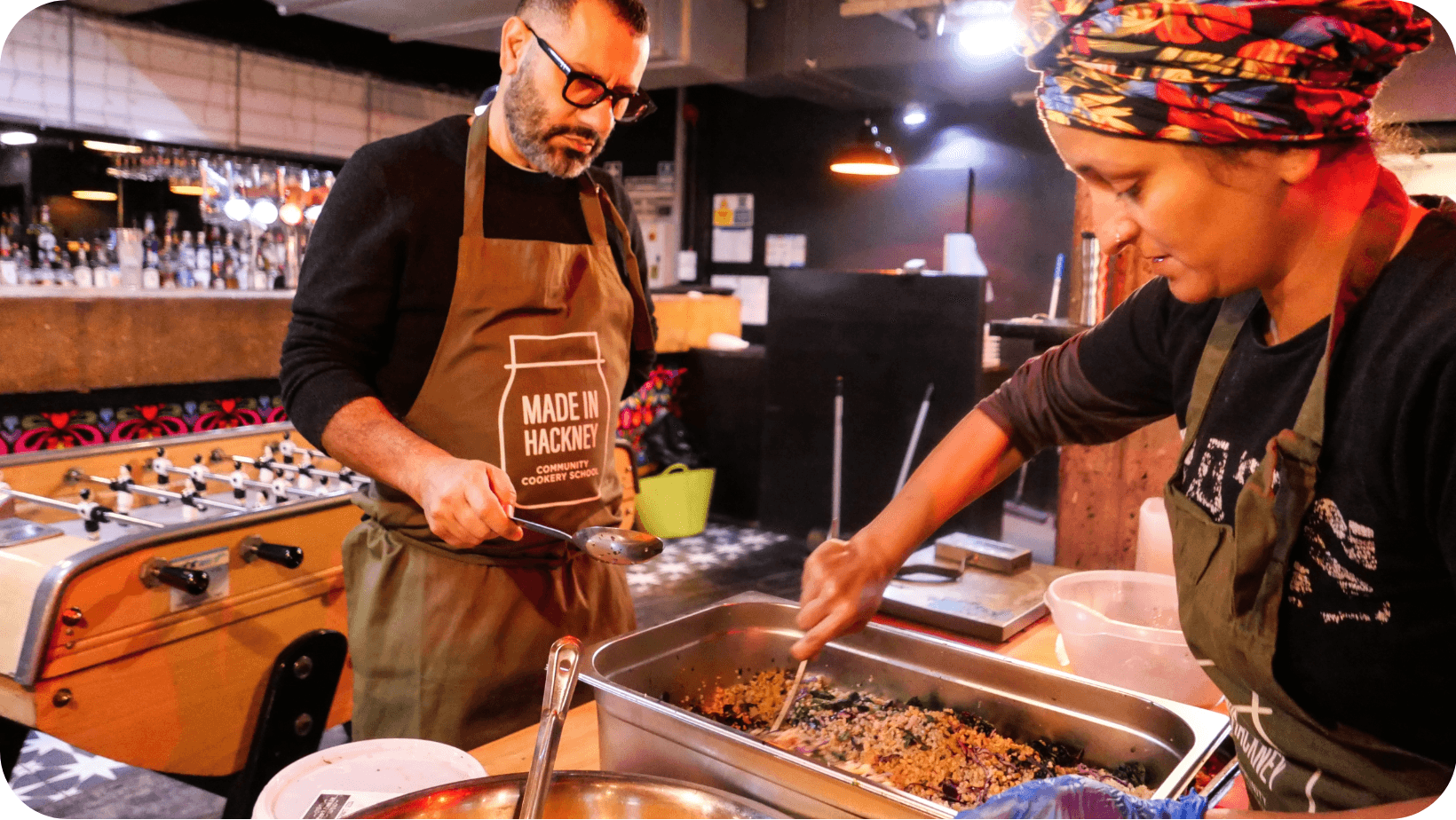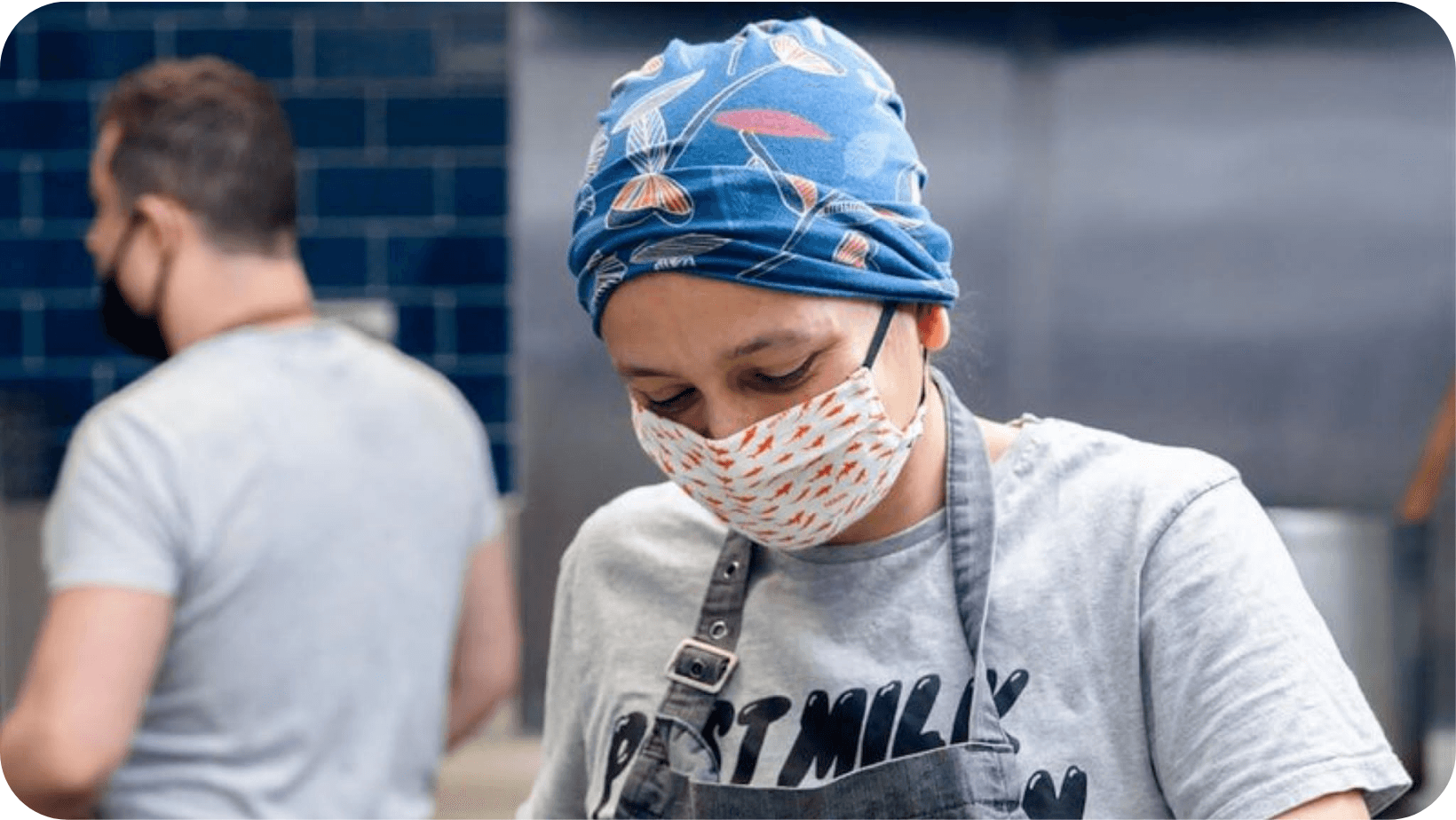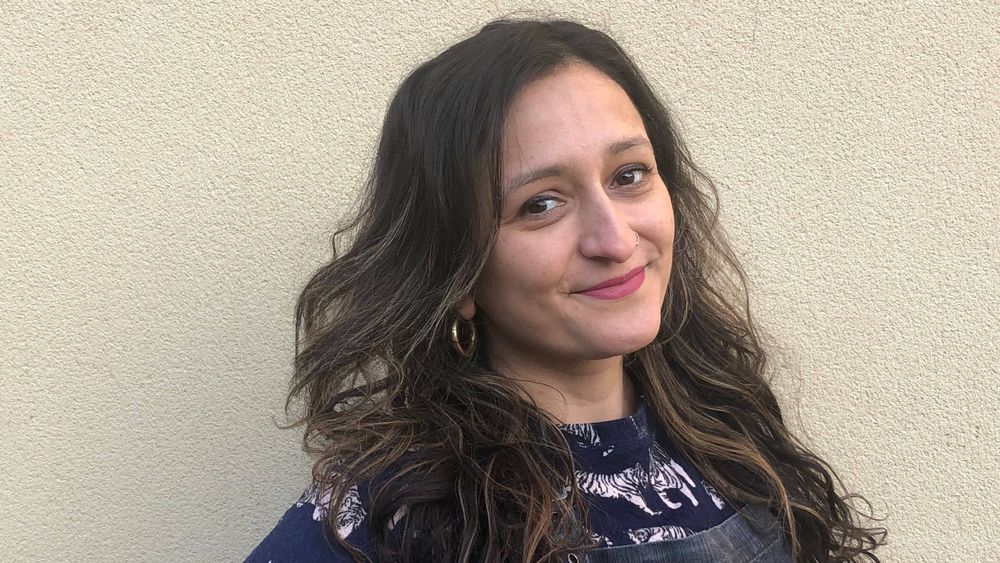Made In Hackney’s Sareta Puri: Plant power to the people
Made In Hackney (MIH) is a non means-tested, culturally diverse plant-based community cookery school, providing plant power to the people through classes, wild food walks and essential free nutritious vegan meals to those in need. It was the first plant-based community cookery school and was set up in 2012 by Sarah Bentley and is about to reach its ten-year milestone.
Sareta Puri was Made In Hackney’s Head Chef August 2020 - December 2021. The free meal service was set up in April 2020 by MIH in response to the pandemic; roughly 200 people receive this service a week. Sareta was instrumental in heading the kitchen team to produce emergency food for those in the community that most needed it through the pandemic. Her current role is Cookery Teacher & Special Projects. Sareta is still intrinsically involved in Made In Hackney and one of her focuses currently is their Plant Futures programme - Sareta co-wrote the training and is the lead trainer. Sareta became vegetarian when she was eight as a result of “seeing pigs as her best friends” and has been vegan for seven years. She was kind enough to sit down with us and answer some questions.
V-Land UK (V-L): How were you able to keep the free meal service going through the pandemic?
Sareta Puri (SP): For the first three to four months from April 2020 we ran the free meal service in conjunction with Angelina a restaurant in Dalston as it was closed due to the pandemic. Off the back of a massive crowdfunding campaign we ran it in collaboration with them: it was our project but they had the kitchen and the team, so they made it happen. They reopened around July and then I was brought in by Sarah to run the kitchen, which we set up in what was essentially an empty restaurant; we were there two days a week making six meals for each of the individuals who were signed up to the service, which provided them with a hot meal (once reheated by them) almost every day of the week, with three being delivered on the Tuesday and three on Thursday. It was also hard for our community classes as prior to the pandemic they were all in-person and we had to move them all online.
V-L: So the meal service was a short-term response and now potentially you are hoping to be able to continue it for as long as you can?
SP: Absolutely. The plan was to run the service for two months but the pandemic continued as there was a clear need, so we kept it going and it is still being provided at the moment and we hope to be able to continue running it. If we can continue to be funded to deliver the foodservice, we absolutely will. We realised that if people say they need food, we need to believe them. We don’t means-test anyone. Unfortunately, society is in a position where some people do not have access to food. We rely on donations to our crowdfunding to run the service, in December we reached the goal of £150,000 which enables the service to run for one year, until December 2022. The meal service also does welfare calls, so if individuals are struggling we may signpost them to somewhere else to help them out.
V-L: What was the inspiration behind the Plant Futures programme? And how is this being received?
SP: We were wondering how we could encourage businesses, organisations and local groups to put more plant-based options on their menu and thought that giving them the information and skills to do so could provide value and positive change. It is being received really well we have done three of the ten cities so far; we will have been to all ten within the next twelve months. They have all been fantastic. It is very easy to live in a ‘vegan bubble’ or a ‘London bubble’ but to go out there and to see there are so many people who are passionate about these issues and that they are not necessarily plant-based or running vegan businesses, but they understand the benefits for the environment, health and animals. People want to know more and want to learn; they are also very interested as we have done this for a decade and we know what we are talking about. We have also been learning from other people.
V-L: We noticed quite a few notable people have been involved with MIH; who are some of the most famous ones you have worked with?
SP: Andi Oliver came down to the meal service the other week, that has been amazing as she has a really good following and is really on board with what we do. The BOSH! guys also came down to the meal service and will be doing a webinar with us later in the summer. Sami Tamimi came down in December in my last week, I was tasked with scaling up his dish to two hundred portions, which was quite terrifying but I managed to do it and he loved it which was nice. We also had Olivia Colman who gave out some meals at the start of the pandemic!

V-L: What was your most memorable moment during your time as Head Chef?
SP: There were a lot of memorable moments. On the very first day that we were meant to cook we couldn’t access the building that we were tasked to go in because the electricity had been disconnected because it was an empty restaurant and I don’t think the landlord had paid the bills. I tried to go in the day before to take some stock in, luckily I went and found this out before the actual start day. The keys had been changed and there was a sign saying contact London Electricity or something similar. We tried everything from getting in touch with the head of the electricity board to trying to persuade the landlord to do something and even Hackney Council to try and help us. This was at the height of the pandemic - everything was closed. There were loads of empty kitchens but because of bureaucracy we couldn’t necessarily get into these empty kitchens.
We eventually managed to convince one venue to give us the kitchen for the day. We managed to get our cooking equipment from where we were initially meant to be cooking in, but couldn’t turn on the electricity; we then managed to get a van to transfer all of this early in the morning to the temporary kitchen and then at the end of the day brought it all back. This was the first day cooking as a team so we didn’t really have systems in place and weren’t completely sure how to scale up the meals. We learned a lot in one day!
But, from then it just got better and better and better. You are constantly facing a challenge in that environment so we knew we could respond to anything after that first day - we worked really closely as a team. Another fond memory was the community we built within the team across the meal service and community cooking aspects of MIH. It gave those involved a purpose, people to meet and to have a laugh with and meet others during the challenging times of the pandemic in which many were furloughed and struggling due to social isolation. Many volunteers said that it had made everything better and changed their lives!
V-L: Do you believe innovation is an important element of how successful Made In Hackney is in supporting the local community? If so, how do you encourage innovation within the team and organisation?
SP: MIH is a very collaborative place. There isn’t really any hierarchy the main management team of MIH we follow a sociocratic system: everyone is equal, everyone has a say on any issue, everyone is paid the same - even the founder Sarah. There is no one who makes the final decision and has greater influence than the others. I think that has really helped to innovate over time because we have all listened to each other and we have also engaged in the community; we have had to be quite responsive to what they say they want. It’s not as if the main management team are the sole decision-makers - the community are clear stakeholders and part of the decision-making process also.
In relation to the meal service, having a team of chefs who are there because they want to be there and are really passionate about what we do, meant that every week we could come up with different meals. The chef team was rather diverse culturally which meant that each member brought ideas from their own heritage and areas they are trained in, or when travelling abroad or are childhood favourites. We would all learn from one another - so those factors definitely helped.
V-L: If there were many more community-based kitchens such as Made in Hackney do you think it could have a significant impact on reducing chronic disease?
SP: Absolutely. If you can educate and inform people and arm them with that skill set to be able to enact these ideas: educating individuals about how to shop more efficiently, economically and healthily; helping them navigate what options to choose if eating out; as well as giving them the skill set of being able to cook nutritious food can create sustainable, positive change. We found from our research that every person we engage with and passes on to four other people: we’ve reached 100,000 directly, but that’s cascading to 400,000.
V-L: Do you think MIH has a deeper impact beyond educating, informing and providing meals?
SP: Definitely, it provides a sense of community and belonging for those that come to our classes, some come just because it’s a nice thing to do. It’s also been helpful in bringing together people from different cultures and communities as well as bringing people together within those communities that might not have done so otherwise. During the pandemic some people’s only human contact during the week was with our delivery drivers and they would have a small chat for maybe thirty seconds or a couple of minutes on their doorstep, and that just uplifted them. We also try and raise awareness around food justice issues on our social media as we believe it’s really important for people to know where their food is coming from and the environmental, health and animal impacts of it. We stretch far beyond Hackney in our reach.

Hubub
V-L: Has the rise in the cost of living put pressure upon MIH and the individuals that use and rely on it?
SP: Yes. People have got less disposable income which has negatively impacted upon two areas; classes and the meal service. As the public is being squeezed financially they are having to make decisions about what to prioritise - this is not limited to just those on lower incomes - and our classes have unfortunately had to be moved down that priority list for many. It has also meant that the meal service is even more vital as for some individuals it is their only food; if their delivery doesn’t arrive or they miss the delivery, they might not have a meal and they phone us up and they can be quite upset. Some can’t even afford to heat up their meals anymore, so they have to eat them cold. For some of the individuals we provide them with seven rather than six meals a week as without the seventh meal they would have no way of eating on that day.
There have always been people on the waiting list as we can only cook so much due to the limitations in space, capacity (within the free venue - Queen of Hoxton pub which offer it up two days a week - we use to prepare the meals, we couldn’t do it without their kindness), and the time it takes to cook two hundred portions. More and more people are joining the waiting list, and often they are individuals you may not think would be on the waiting list for a service like this.
The majority of the produce for the meal service is donations from organisations such as The Felix Project, City Harvest, Edible London and certain vegan brands/businesses like Club Mexicana, Better Nature and THIS. We have a rough plan of what we will be preparing ahead of time, but we need to be flexible and it allows us to cook different meals most weeks. An issue we are having is a lack of volunteers, as most people have now returned to work post-pandemic and also individuals desperately need any extra money at the moment.
V-L: Do you believe that our education system should have compulsory cookery and nutrition classes?
SP: Yeah, I think so. I think nutrition and cooking are core skills as well as learning about how to budget effectively and where to get your food. Often in poorer neighbourhoods they don’t have access to a large supermarket, they often have a cornershop which has nothing that is fresh and a limited option of foodstuffs. We find it is often a skill which is lacking in adults as well as children.
V-L: MIH is approaching a decade, what do you think could be achieved in the coming decade?
SP: We want MIH to be educating and inspiring even more people outside of London. Our Plant Futures Programme is the first step in achieving this vision as well as trying to support others to do their own community food services. We are also working on a Global Training and Mentorship Programme that will be launching in 2023 which will help others learn within and outside the UK how to do as we have been able to do at MIH. We can share our experience, knowledge and mistakes we have learned from so hopefully they can do it more rapidly then we were able to; such as within three rather than ten years.
We also hope that by the end of the next decade we will see some of the societal changes enacted such as health conditions reducing, more people eating plant-based food, people not having to live against a cost of living increase, for there to no longer be a lack of accessibility for nutritious, reasonably priced food: I think we will be responsive to the progress made in these areas, we want to see a better, fairer, more just world and for us to have played a part in making this happen.
Maybe, in order to save the NHS, there needs to be an investment into more places such as Made in Hackney? Well, Made In Hackney’s data very strongly suggests so: of the 4465 individuals they worked within 2019-2020, 94 per cent ate more fruit and vegetables, 87 per cent now eat less junk food, 97 per cent of volunteers said their experience enhanced their sense of community and 94 per cent of volunteers said the classes improved their overall mood.
They not ‘only’ provide essential meals but provide individuals with the skills to take personal power and responsibility for their health, and a cornerstone for better health is eating more plants which is what Made in Hackney preaches. You can volunteer, donate, sign up to their newsletter or simply find out more on their website or Instagram.
If you are interested in plant-based nutrition you may like to also read our article about whether plant-based nutrition can help prevent and treat type 2 diabetes.
